The Intel Skylake-X Review: Core i9 7900X, i7 7820X and i7 7800X Tested
by Ian Cutress on June 19, 2017 9:01 AM ESTBenchmarking Performance: CPU Encoding Tests
One of the interesting elements on modern processors is encoding performance. This includes encryption/decryption, as well as video transcoding from one video format to another. In the encrypt/decrypt scenario, this remains pertinent to on-the-fly encryption of sensitive data - a process by which more modern devices are leaning to for software security. Video transcoding as a tool to adjust the quality, file size and resolution of a video file has boomed in recent years, such as providing the optimum video for devices before consumption, or for game streamers who are wanting to upload the output from their video camera in real-time. As we move into live 3D video, this task will only get more strenuous, and it turns out that the performance of certain algorithms is a function of the input/output of the content.
HandBrake H264 and HEVC
As mentioned above, video transcoding (both encode and decode) is a hot topic in performance metrics as more and more content is being created. First consideration is the standard in which the video is encoded, which can be lossless or lossy, trade performance for file-size, trade quality for file-size, or all of the above can increase encoding rates to help accelerate decoding rates. Alongside Google's favorite codec, VP9, there are two others that are taking hold: H264, the older codec, is practically everywhere and is designed to be optimized for 1080p video, and HEVC (or H265) that is aimed to provide the same quality as H264 but at a lower file-size (or better quality for the same size). HEVC is important as 4K is streamed over the air, meaning less bits need to be transferred for the same quality content.
Handbrake is a favored tool for transcoding, and so our test regime takes care of three areas.
Low Quality/Resolution H264: He we transcode a 640x266 H264 rip of a 2 hour film, and change the encoding from Main profile to High profile, using the very-fast preset.
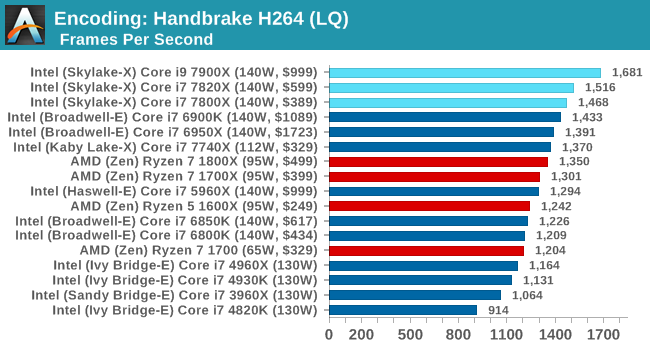
More cores, more frequency, more IPC, more fun: the Core i9-7900X wins here, and even the i7-7800X wins out against the Core i7-6900K.
High Quality/Resolution H264: A similar test, but this time we take a ten-minute double 4K (3840x4320) file running at 60 Hz and transcode from Main to High, using the very-fast preset.
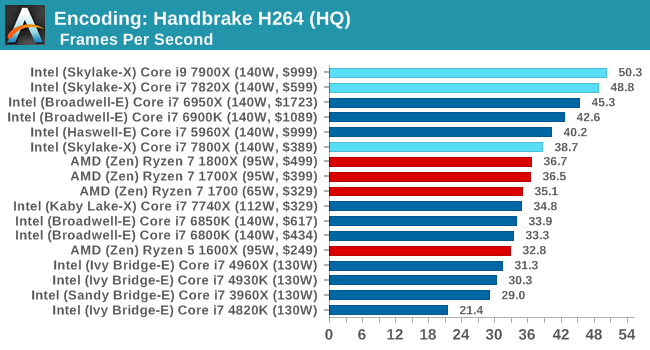
Moving into HQ mode means making the job more parallel, so the higher core counts stay at the top of the chart.
HEVC Test: Using the same video in HQ, we change the resolution and codec of the original video from 4K60 in H264 into 4K60 HEVC.
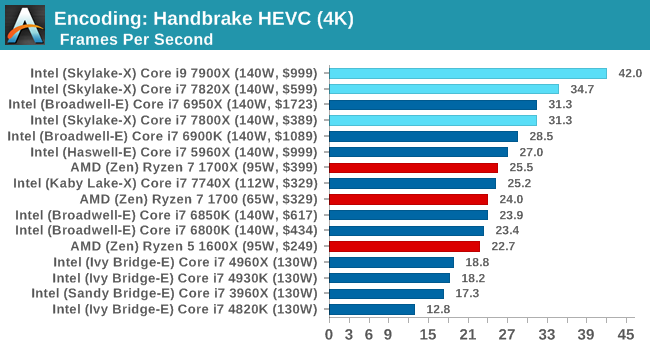
WinRAR 5.40
For the 2017 test suite, we move to the latest version of WinRAR in our compression test. WinRAR in some quarters is more user friendly that 7-Zip, hence its inclusion. Rather than use a benchmark mode as we did with 7-Zip, here we take a set of files representative of a generic stack (33 video files in 1.37 GB, 2834 smaller website files in 370 folders in 150 MB) of compressible and incompressible formats. The results shown are the time taken to encode the file. Due to DRAM caching, we run the test 10 times and take the average of the last five runs when the benchmark is in a steady state.
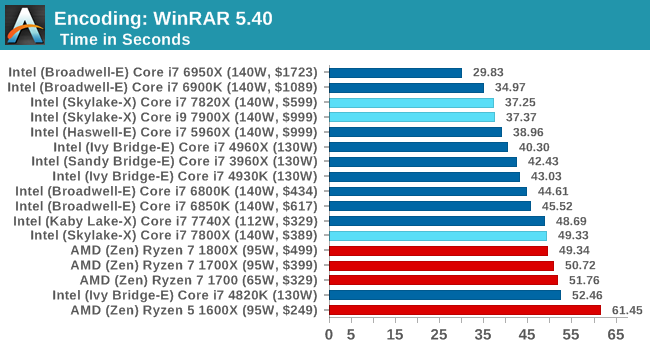
WinRAR loves having access to all the caches as much as possible, to prefetch and store data as needed. The Skylake-X chips fall back a bit here, even with DDR4-2666 support. The Core i7-7800X uses DDR4-2400 memory, so puts it further behind. Interesting didn't realise that the lower core count Broadwell-E chips were affected so much by this test, and the higher core count Ivy Bridge-E parts are faster here.
AES Encoding
Algorithms using AES coding have spread far and wide as a ubiquitous tool for encryption. Again, this is another CPU limited test, and modern CPUs have special AES pathways to accelerate their performance. We often see scaling in both frequency and cores with this benchmark. We use the latest version of TrueCrypt and run its benchmark mode over 1GB of in-DRAM data. Results shown are the GB/s average of encryption and decryption.
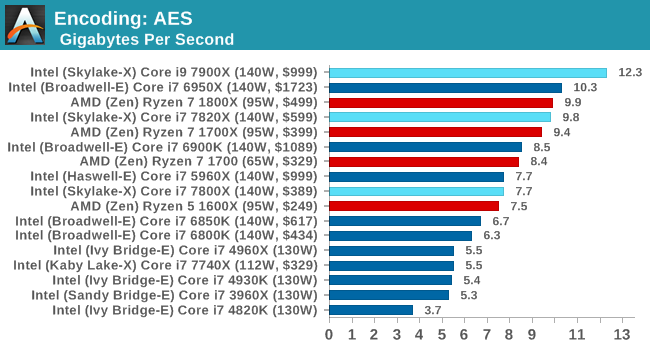
7-Zip
One of the freeware compression tools that offers good scaling performance between processors is 7-Zip. It runs under an open-source licence, is fast, and easy to use tool for power users. We run the benchmark mode via the command line for four loops and take the output score.
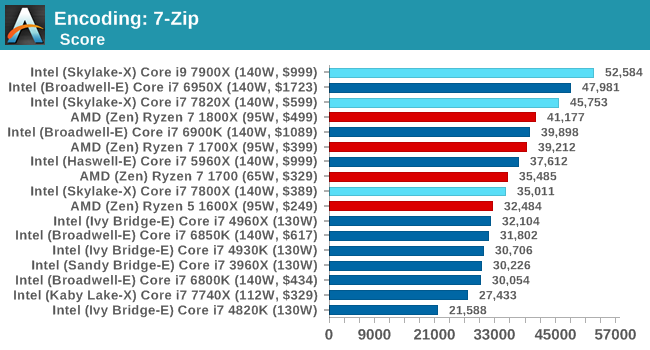










264 Comments
View All Comments
Ian Cutress - Monday, June 19, 2017 - link
We didn't post gaming data in our launch Ryzen 7 review for the same reason. You are applying double standards.http://www.anandtech.com/show/11170/the-amd-zen-an...
melgross - Monday, June 19, 2017 - link
Man, another guy who didn't actually read the article, but reads other poster's remarks who also didn't read the article. Can't we just deleted these jerks remarks?koomba - Thursday, July 6, 2017 - link
Please go back and tag my reply on page 7. Short version: you are wrong, they did NOT do gaming benchmarks on their launch Ryzen review either.So quit whining about something that DIDN'T HAPPEN and using it as a weak excuse to bash this site. Your blatant AMD fan boy agenda is pathetic.
nicolaim - Monday, June 19, 2017 - link
Typos. Second table on first page says i7 instead of i9.nicolaim - Monday, June 19, 2017 - link
And incorrect MSRP for Ryzen 7 1800X.Ryan Smith - Monday, June 19, 2017 - link
Please be sure to reload. Both of those issues on the first page were corrected some time ago.Bulat Ziganshin - Monday, June 19, 2017 - link
I have predicted details of AVX-512 implementation 1.5 years ago when SKL-S microarchitecture was described in Intel optimization manual. These are details:http://www.agner.org/optimize/blog/read.php?i=415#...
Einy0 - Monday, June 19, 2017 - link
Very disappointed that AT did not publish game benchmarks because they didn't show Intel in the best light but had no problem making a big deal about Ryzen's gaming issues. This isn't the brand of journalism that Anand built this site on. It's certainly not what attracted me to the site and has had me coming back for 20 years. I come for unbiased straight shooting PC technology reviews. Now we get a mobile focus and biased PC hardware reviews. Not to mention the full screen popup ads and annoying hover ads that refuse to go away. How far the mighty have fallen!Ian Cutress - Monday, June 19, 2017 - link
We never posted Ryzen 7 gaming benchmarks in our launch review for the same reason. Please go back and check:http://www.anandtech.com/show/11170/the-amd-zen-an...
melgross - Monday, June 19, 2017 - link
You know, it almost doesn't pay to respond to these guys. They're AMD fanboys who are too lazy to read the article first, and they won't read your link either, because they don't want to. They want to believe what they say, no matter what.